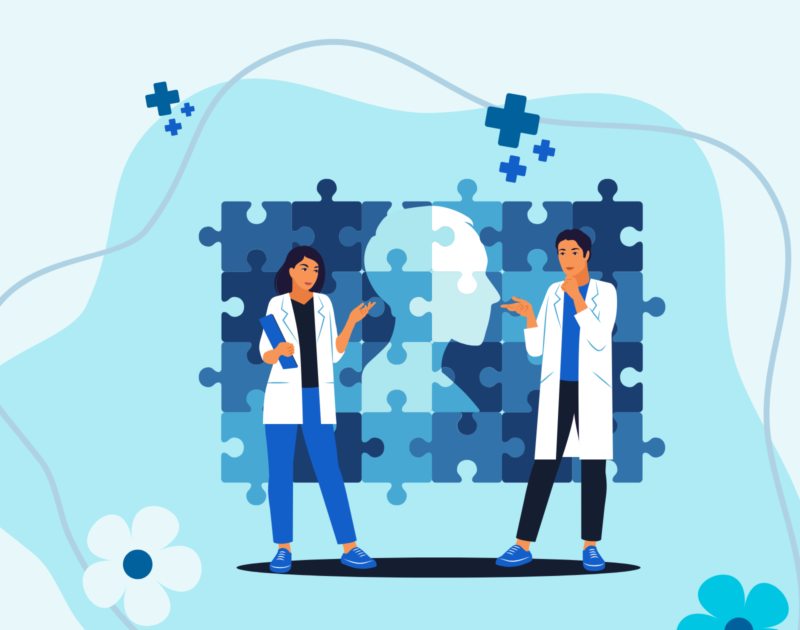The traditional medical industry is experiencing significant transformation through artificial intelligence AI in healthcare, which delivers innovative solutions to enhance patient outcomes in today’s digitally advancing environment. The implementation of predictive analytics and AI-powered diagnostic tools has transformed healthcare processes, opening up the possibility for a future where health care becomes both smarter and healthier.
This comprehensive guide examines the use of AI in healthcare by companies while investigating their advantages and practical applications along with new possibilities in the medical field. We’ll explore how AI and machine learning solutions are shaping the future of medicine, from AI medical devices to cognitive healthcare software development.

How Do Artificial Intelligence (AI) and Machine Learning (ML) Function Within the Healthcare Sector?
It’s important to first define artificial intelligence (AI) and machine learning (ML) along with their specific roles in healthcare before exploring deeper topics.
Key Differences Between AI and ML
Artificial Intelligence (AI) involves developing machines or software that replicate human cognitive functions through abilities like decision-making and visual perception. In healthcare, AI is being used to enhance everything from patient care management to drug discovery.
Machine Learning (ML) represents a division of AI which enables systems to autonomously learn from data through experience without manual programming. ML models undergo development through time by refining their effectiveness through ongoing data analysis. ML development services are becoming increasingly crucial in healthcare for tasks such as predictive analytics and personalized medicine.
Common Applications in the Medical Field
AI and machine learning solutions offer diverse applications, including:
- Medical diagnosis and imaging
- Personalized patient care
- Drug discovery and clinical trials
- Virtual health assistants and chatbots
- Remote monitoring via smart healthcare devices
- Operational efficiency in hospital management
- Clinical decision support systems
Disease Diagnosis and Early Detection
Patient survival rates improve dramatically through early disease detection, and AI remains crucial in this process.

AI in Radiology and Medical Imaging
The field of radiology has experienced significant transformation through AI medical technology, which automates and improves the analysis of medical images including X-rays, CT scans, and MRIs. Radiologists receive assistance from algorithms that learn from extensive imaging datasets to identify patterns, leading to quicker and more precise diagnoses. This is a prime example of how artificial intelligence in healthcare is revolutionizing medical devices.

Advanced Machine Learning Algorithms Detect Early Symptoms of Cancer and Chronic Diseases Through Big Data Analysis.

By processing extensive patient data, including electronic health records, healthcare machine learning algorithms can detect the early indicators of cancers and chronic diseases such as diabetes, heart disease, and Alzheimer’s. Healthcare predictive analytics lead to better early intervention approaches while enhancing patient health results.
Real-Life Case Studies and Examples
IBM Watson: Memorial Sloan Kettering Cancer Center uses IBM Watson to assist medical professionals in selecting personalized treatment plans.
Google’s DeepMind: Google’s DeepMind developed a mammogram analysis system that identifies breast cancer with greater precision than human radiologists.
PathAI: PathAI uses machine learning techniques to enable pathologists to diagnose cancer with unmatched precision.
Personalized Patient Care and Treatment
Analyzing Health Data for Customized Treatment Plans
AI systems generate customized treatment plans by analyzing historical patient data alongside genetic information and lifestyle factors. This approach to personalized medicine improves both patient adherence and treatment effectiveness. Cognitive healthcare software development plays a crucial role in creating these sophisticated systems.
AI’s Role in Improving Patient Outcomes
AI insights empower healthcare providers with better patient response prediction capabilities while minimizing side effects and enabling ongoing treatment plan improvements. This significantly upgrades patient care quality and results, leading to improved AI-driven patient outcomes. The concept of Omni ML, which integrates multiple machine learning approaches, is particularly promising for delivering comprehensive personalized care.
AI in Drug Discovery and Development
Reducing R&D Time Using Machine Learning
Traditional methods of drug discovery require significant financial resources and take multiple years to complete. AI algorithms accelerate drug discovery by quickly analyzing large molecular databases to find possible drug candidates, which reduces both research time and development expenses. AI development services are at the forefront of this revolution in pharmaceutical research.
Predicting Drug Interactions and Effectiveness
Through their ability to predict drug-drug interactions and patient reactions, machine learning in healthcare models enhance both drug safety profiles and clinical trial results. BenevolentAI and Atomwise demonstrated effective applications which accelerated drug discovery at exponential rates.
Virtual Health Assistants and AI Chatbots

How AI Supports Patients 24/7
Medical guidance becomes instantly accessible through AI-powered assistants such as Babylon Health and Ada. These virtual health assistants deliver patient responses to inquiries while scheduling appointments and medication reminders and providing preliminary diagnostic advice, which enhances healthcare accessibility.
Improving Accessibility to Basic Healthcare Guidance
AI chatbots effectively manage non-emergency patient queries, which helps reduce patient load at healthcare facilities. The presence of this service significantly benefits rural communities and underserved areas that experience restricted access to medical professionals.
Remote Monitoring and Wearable Technology
AI in Real-Time Patient Health Tracking
AI-powered medical devices like fitness trackers and wearable ECG monitors supply uninterrupted real-time patient data, which facilitates immediate medical response to critical conditions. Edge AI technology in these devices allows for quick, on-device processing of health data. These innovations fall under the category of software as medical device, which is transforming how we approach patient monitoring.
Preventive Care Through Smart Devices
Wearable health technology detects medical abnormalities early, which leads to enhanced preventive healthcare strategies. The Apple Watch’s ECG function, an example of AI medical technology, has saved many lives through its ability to detect irregular heart rhythms before major health crises happen.
Hospital Management and Operational Efficiency
AI for Staff Scheduling and Inventory Management
The operation of hospitals requires meticulous management of resources because they are complex systems. AI in healthcare software development increases operational efficiency by optimizing staff schedules while streamlining inventory tracking and predicting equipment needs. MLOps practices are increasingly being adopted to manage and deploy these AI and ML models effectively in healthcare settings.
Read Also: Pharmacy Management Software Development: Features, Benefits & Costs
Streamlining Hospital Workflows with Machine Learning
Machine learning enables hospitals to automate routine administrative duties while managing patient admissions more effectively and predicting patient volume, which results in decreased overhead costs together with better resource allocation.
Challenges and Ethical Concerns
Healthcare holds tremendous possibilities with AI integration but faces particular obstacles.
Data Privacy and Patient Confidentiality
Healthcare data is sensitive. Protecting patient information by following HIPAA rules remains essential for healthcare operations. Successful AI implementation requires strong cybersecurity measures and adherence to AI ethics guidelines. AI compliance is a critical consideration for healthcare organizations implementing these technologies.
Addressing Algorithmic Bias in Healthcare AI
Biases in healthcare algorithms create disparities in treatment results for patients. To reduce healthcare delivery biases and guarantee equity, diverse data representation together with transparent algorithmic processes must be ensured. AI governance frameworks are crucial in addressing these concerns. The concept of responsible AI is gaining traction in the healthcare industry to ensure fair and ethical use of these technologies.
Future of AI and ML in Healthcare
Emerging Trends and Innovations
The next phase of AI-driven healthcare will expand telemedicine capabilities and bring advanced robotic surgery to healthcare while advancing precision medicine and utilizing augmented reality for medical training. Healthcare startups propel innovation by creating advanced predictive tools and real-time patient monitoring systems. Generative AI and Artificial Intelligence Medical devices in healthcare is also emerging as a powerful tool for creating synthetic medical data and assisting in drug discovery.
The Role of AI in the Next Decade of Healthcare
As healthcare technology evolves, artificial intelligence and machine learning in healthcare will shift from being supplementary technology to becoming an essential part of healthcare systems while affecting all areas from direct patient interaction to healthcare policy development. The development of AI will lead to enhanced operational efficiency along with improved accuracy and customized patient experiences in healthcare.
How Lunar Web Solution Helps Drive AI and ML Innovation in Healthcare
The implementation of AI and ML technologies needs partners who possess specialized expertise in AI and ML development services. Lunar Web Solution distinguishes itself as a leading provider of AI and ML development services being one of the best machine learning development company in India by delivering complete AI and machine learning solutions specifically designed for healthcare organizations.
Lunar Web Solution specializes in:
- Developing intuitive AI-driven medical diagnosis systems
- Implementing predictive analytics tools for healthcare providers
- Virtual health assistant programs and patient engagement systems receive custom software solutions
- Lunar Web Solution merges smart healthcare devices with remote patient monitoring systems
- Streamlining operational efficiency using advanced AI models
Healthcare organizations which partner with Lunar Web enjoy scalable solutions designed to meet current industry needs and establish themselves as leaders in healthcare innovation. As an AI consulting services provider, Lunar Web Solution offers comprehensive support for AI and ML services adoption strategies and AI maturity assessment, including guidance on FDA artificial intelligence regulations and FDA software as a medical device compliance.
Read Also: How to Choose the Right Healthcare Software: A Buyer’s Guide
Conclusion
AI and ML integration transforms healthcare through better diagnosis accuracy, personalized patient care, drug discovery acceleration, and operational streamlining. The substantial advantages of Artificial intelligence services and Machine Learning services in healthcare implementation overshadow the existing challenges and indicate an innovative future for medical services.
Today’s organizations that adopt AI technologies ensure their future readiness while improving patient satisfaction and operational performance. Lunar Web Solution continues to drive healthcare innovation by implementing advanced AI and machine learning solutions, which positions them as the perfect partner for healthcare companies starting their essential digital transformation journey in the rapidly growing healthcare AI market. As the industry evolves, staying informed about FDA AI guidance and maintaining AI compliance will be crucial for organizations leveraging these powerful technologies to improve patient care management and drive better health outcomes.





